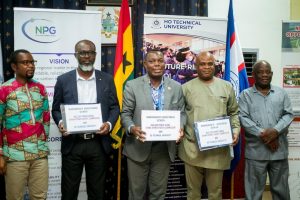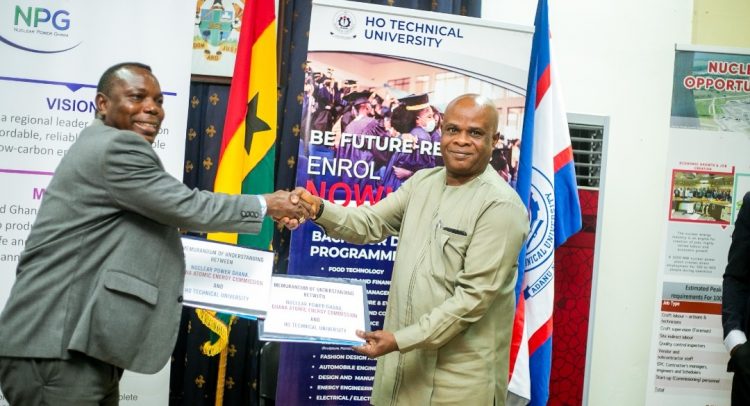HTU Vice Chancellor, Prof. Ben Honyenuga exchanging the MoU with the Nuclear Power Ghana team
The Ho Technical University (HTU) has expressed its readiness to become a hub for training professionals to take up Ghana’s nuclear power development agenda.
To this end, it has signed a Memorandum of Understanding (MoU) with Nuclear Power Ghana (NPG) and Nuclear Power Institute (NPI) to train students and other nuclear-related experts to take up the development and management of Ghana’s Nuclear Power Programme.
The MoU was signed in Ho at a brief ceremony after several months of discussions and negotiations between the University on one part and the Nuclear Power Ghana, Nuclear Power Institute, and Ghana Atomic Energy Commission (GAEC) on the other hand.
The signing which was witnessed by heads of departments and faculties of the university and senior members of the NPI, NPG, and GAEC seeks to make HTU the first University to partner with Nuclear Power Ghana (NPG) to undertake its mandate of developing and managing Ghana’s Nuclear Power programme.
Ghana’s vision to undertake a Nuclear Power programme dates back many years. However, the project was shelved until recently, when the country’s power challenges brought the programme back onto the discussion table.

In 2018, Ghana established NPG to be the owner and operator of the country’s proposed Nuclear Power Plant. It was then registered as a Limited Liability Company in 2019. The founding team of NPG was selected from the Volta River Authority (VRA), Bui Power Authority (BPA), and GAEC.
The Board Chairman of the NPG, Prof. Benjamin J.B. Nyarko said with the legal and political backing of the state, the NPG is poised toward building Ghana’s Nuclear Power Plants and producing affordable electricity in a safe and environmentally friendly manner for socio-economic development.
NPG is currently in its second phase of operationalizing Ghana’s first nuclear power plant by 2030.
However, the challenge has been having adequate qualified human resources ready for the plant. Therefore NPG’s partnership with HTU is timely as it joins the School of Nuclear and Applied Sciences of the Nuclear Ghana Institute, established in 2006, in becoming the pioneers of a consortium of universities formed to generate the needed resources for the programme.
The Executive Director of NPG, Dr. Stephen Yamoah assured that HTU will be provided the needed human and technical support to become a hub for training world-class nuclear specialists. Since it takes about five to ten years to train the required experts, NPG believes HTU is well positioned to create a conducive environment for a nuclear power future.
Prof. Seth K. Debrah, the Director, Nuclear Power Institute (NPI), said as a technical university, HTU is ripe to train professionals for nuclear power such as welders, pipefitters, masons, carpenters, electricians, heavy equipment operators, protective gear makers, caterers among others.
The entire student body and staff will also be trained in a foundational course, especially on the health, safety, and security of nuclear plants. This, he believed will turn HTU into the fulcrum where the technical ability for nuclear power is built.
Prof. Adomako Kissi, Deputy Director of GAEC dispelled assumptions that nuclear power plants were harmful to the environment and residents, saying that Ghana has experience in managing an Atomic energy plant for decades and yet there have been no issues. Hence residents and the university community should rest assured because a nuclear power plant will bring them more benefits.
Prof. Ben Honyenuga, the Vice Chancellor of HTU stressed that the University “was ready and willing” to roll out diploma and bachelor competency-based programmes in nuclear sciences. He added that HTU wants to be involved in all aspects of the nuclear power value chain, as professionals in the field are rare and one of the best paid globally.
He, therefore, charged both teams to do everything in their power to make the MoU a reality; adding that his team led by the Director of Technical and Vocational Educational should ensure the foundation course begins immediately.
From Fred Duodu, Ho (k.duodu@yahoo)


